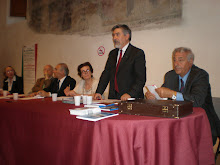Algeria's
president, Abdelaziz Bouteflika, will stand for a fourth term in the
forthcoming elections on April 17th, according to a statement by the
prime minister, Abdelmalek Sellal, on February 22nd. Although
Mr Bouteflika's win is all but certain, his ill-health means that his
re-election will do little to mute the succession debate. Mr Sellal is
well placed to take over after the ageing president, but an increasingly
fragmented political scene poses threats to stability in the longer
term.
Mr Bouteflika had decided to stand owing to the "insistence of the
representatives of the 46 municipalities" visited by the prime minister,
said Mr Sellal in a press conference on the margins of a ceremony to
mark the opening of the African conference on green energy. The
president had "given his all" for Algeria "and would continue to give
even more", said Mr Sellal. The interests of the country in terms of
"stability and development" came "before everything else", he added.
Later the same day Mr Bouteflika submitted his letter of intention to
stand to the Ministry of the Interior, and acquired the forms necessary
for the collection of the 60,000 signatures across at least
25 municipalities needed to qualify for candidacy in the elections.
Too ill to rule?
After months of speculation, the decision that Mr Bouteflika will
stand is not a surprise but nor had it been taken for granted. The
president is in poor health, and has not made any public appearances
since his return from two months in a Paris hospital between April and
June last year for what was described at the time as a minor stroke. He
has appeared on television, but looked extremely frail, and with no
speech recorded. In one broadcast of a meeting between Mr Bouteflika and
the French prime minster, Jean‑Marc Ayrault, a hand movement made by
the president was repeated several times in an effort to make him look
more animated. The fact that Mr Bouteflika's candidacy was announced by
the prime minister will not have helped to reverse the image of a man
incapable of carrying out his duties.
Fragmenting political scene
It seems that for the regime Mr Bouteflika is the least bad
candidate. Fissures are opening up across Algerian politics, with
apparent divisions between the Bouteflika clan and the powerful state
security service, the Département du renseignment et de la sécurité, and
a split within the largest political party, the Front de libération
nationale (FLN). The triumvirate between the FLN, the Rassemblement
national démocratique (RND) and the Mouvement de la société pour la
paix (MSP) that was the foundation of Mr Bouteflika's government for
much of his 15 years in power has collapsed. The RND, whose leader left
his post in January under pressure from party members, is weakened and
appears to have been sidelined by the FLN, and the MSP has quit the
ruling alliance and has now announced its intention to boycott the
presidential election. Add to this a terrorist attack on the major gas
facility of In Amenas in January 2013 and sectarian troubles in the town
of Ghardaia, as well as a long list of unpopular alternatives to the
incumbent president, and there were few indications that this was a
propitious time for a change in leadership in Algeria.
Bouteflika set to win but succession issue looms large
It can now be assumed that Mr Bouteflika will win a landslide
majority in the forthcoming poll. More than 100 candidates have
announced their intention to run for the presidency, but many of them
are likely to withdraw their candidacy rather than challenge the
president and the machinery of state that will be mobilised behind his
campaign. This, together with a lack of strong challengers and an
electoral process skewed in favour of the regime, means that we expect
Mr Bouteflika to win re-election.
But the decision leaves unanswered all of the troubling questions
that have ultimately led the regime to default to a decision to stand
behind a sick man as the country's leader for the next five years. Most
prominent among them is who will succeed Mr Bouteflika in the event of
the death of the president, who will be 77 by the time of the election,
and has now been in a consistent state of ill health for almost a year.
The government has made it clear that as part of a long-planned
programme of constitutional revisions it plans to create a position of
vice-president, the duties of which will include the leadership of the
country in the event of the president's death or sudden incapacity. But
just as the regime failed to reach a consensus over an alternative to
Mr Bouteflika in the presidential race, it is likely that reaching
agreement over the identity of the first vice-president will also be a
difficult process.
There has been speculation that the first holder of the post will be
the person who runs the president's re-election campaign. On the
evidence so far, it appears that this is likely to be Mr Sellal. But the
opacity that has surrounded the negotiations over the regime's
preferred presidential candidate in recent weeks and months is likely to
be replicated in the coming weeks and months when a decision is made as
to the identity of the first vice-president. This lack of clarity,
coupled with the serious ill-health of the president, increases
political risk in the short term, and means that stability in the longer
term remains in question.
Economist Intelligence Unit
Source: The Economist Intelligence Unit





















Nessun commento:
Posta un commento